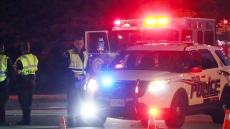OTTAWA — A new federal survey suggests the percentage of students who smoke tobacco fell to about three per cent in 2014-15 from four per cent a year earlier.
The Canadian Student Tobacco, Alcohol and Drugs Survey found declines in both the numbers of students who had ever tried smoking and current smokers.
Alcohol and marijuana were more popular than tobacco.
The study surveyed 42,094 students in Grades 6 to 12 (or Grade 6 to secondary V in Quebec). Students in Grades 7 to 12 were also asked about alcohol and drug use.
It said in 2014-15, 18 per cent of students in Grades 6 to 12 had tried smoking, if only just a puff, down from 24 per cent in 2012-13.
It found that 3.4 per cent of students were current cigarette smokers, with 1.6 per cent smoking daily and 1.9 per cent smoking occasionally.
The Canadian Cancer Society said it is encouraged by the findings, but added the numbers are still too high.

"Youth smoking is still an enormous health concern and far more must be done to stop teens from smoking," the society said in a news release.
"It is good news that fewer teens are smoking but far too many of them are still being seduced by the tobacco industry's tactics," said Rob Cunningham, a senior policy analyst with the society.
Alcohol is the substance with the highest prevalence of use by students. After falling in recent years, use of alcohol in the previous 12 months by students in Grades 7 to 12 remained unchanged in 2014-15 at 40 per cent. Just under one-quarter of students reported drinking five or more drinks on one occasion in the past 12 months, which was down from 39 per cent in 2008-09.
The survey suggested 17 per cent of students in Grades 7 to 12 used cannabis.
This comes as the Liberal government prepares to legalize marijuana with the aim of regulating its use, keeping it away from children and cutting out the criminal element of the business.
A majority of students recognized that regular use of tobacco or cannabis posed a great risk.
The survey also found that three per cent of students reported using prescription painkillers to get high, including one per cent reporting the use of oxycodone and 0.4 per cent using fentanyl.

Health Minister Jane Philpott said she was encouraged by the reported declines, but said there is a need for more prevention efforts.





